- Home
- Daniel Woodrell
Woe to Live On: A Novel Page 4
Woe to Live On: A Novel Read online
Page 4
“Messengers of Good Work.”
“Your banner?”
“The Black Flag.”
In the camp we found a larger group of comrades. George Clyde had rendezvoused with us, doubling our numbers. Clyde was a stout, blocky man, with a strong Scot face. He was exceedingly popular, as he fought at the front when going that way, and the rear when backing up. His boys were good devout fighters and reckless.
Babe Hudspeth found his brother Ray and they hugged each other up. Ray had some slight scratch on him but it was a painless thing.
After our horses were staked out to graze, Jack Bull and I strolled the camp, checking the faces for those that were no longer there. Bill House was dead, killed in the run from the Rawlses’ home, as was Pete Kinney, Dave Lane, Jim Martin and Cass Woods. Helms and Lawson were fried beneath the bed. The fight in the bush had claimed one more man, though not one I knew much. Two men were hurt bad enough to die but they likely wouldn’t. They were tended to in the shade.
The guess was that we had killed six or eight Federals and wounded as many more. That sounded high to me. Our surprise had been so nearly complete that only divine good fortune had kept us from annihilation.
Cave Wyatt was whole, and clapped my back, generous with affection, a big grin on his broad bearded face.
“So glad you made it,” he said. “I thought I would have no one left to pick on, but now you are here.”
“Many aren’t,” I answered.
“True. But they died in the good fight. That is the best way to go.”
I nodded, for this was the only sort of philosophy a freedom fighter could have if he was to avoid insanity.
“Let us hope we don’t all go ‘the best way,’ ” said Jack Bull. He was glumly staring about camp, no doubt brooding over the losses this war had already claimed from him. He would be wealthy no more, and, as he had been raised in that state, it was a bitter fate for him to accept.
It hurt me to see his manly face so forlorn, but I could not alter it.
As the day wore on I familiarized myself with Clyde’s men. They had a surprise for us Ambrose Boys—four Federal prisoners. They had taken them from a mail convoy near Kansas City.
The Federals were tied more or less like yearlings, linked together by a thick rope, anchored to a tree. They trembled a bit and were skittish with their glances, not wanting to look too boldly into our faces.
Several of Clyde’s group sat on the ground watching the prisoners, torturing them with bad jokes.
“Are those good boots, Yank?”
“I don’t know. Could be.”
“They seem to run a mite slow.”
“This time they did.”
“Well, there won’t be any more races for them with you standing in them, will there?”
“I would reckon not.”
“Ho, ho, ho. You are a shrewd reckoner, ain’t you?”
One of the men who lounged there was the oddest comrade thinkable. It was George Clyde’s pet nigger, Holt. He was always called Holt, and he carried pistols and wore our garb. It was said that he was an excellent scout and a useful spy. He looked about like any other nigger but spoke less and had a narrow quality to his face that gave it an aspect of intelligence.
Clyde’s reputation served to protect Holt, but the nigger’s actions also gradually gained him some esteem. He almost never spoke to anyone but Clyde, as he knew his opinions would be scorned. As with most niggers his life was puppeted by slender threads of tolerance at all times.
He was a good field cook, that was proven.
“Holt,” I said to him as I stood.
His eyes came up to mine and held there steady, then he nodded once. There was a shiny effect from his gaze, as though some awful fire was in him. He did not speak.
“Jacob, oh, my Jacob,” someone said to me. I slowly looked for the source and found it among the prisoners. There, hogtied to his poorly chosen comrades, was Alf Bowden, a neighbor of Jack Bull’s and mine from near Waverly.
“Hello, Alf,” I said. “You are in a fix.”
“It seems so,” he said. “It surely does seem so.”
Gus Vaughn, an able bushwhacker, said to me, “You know this man?”
“Certainly,” I said. I walked over and touched Alf on the shoulder. He seemed grateful for the display. His face was haunted by accurate expectations. “His little place was just downriver from the Chiles’ place. Hemp grower.”
Alf was sunken-chested and twig-thin. It was not uncommon to thus meet enemies who had not been so in gentler times. I had helped Bowden raise a barn once, and danced with his sister ’til her face flushed and we both sweated, but I was not in his debt, nor he in mine. It was a good war for settling debts via the Minié-ball payback or the flame of compensation. Many debts were settled before they had a chance to be incurred, but thin-skinned fairness rarely crabbed youthful aim.
I looked down at Alf. It seemed my presence was raising his hopes. Jack Bull Chiles then joined us, and Bowden strained his pale face, trying to summon up a grin.
“Jack Bull,” he said.
Looking down his nose somewhat Jack Bull barely raised his chin in recognition. “Bowden,” he said. “Any news of home?”
The little man started out shaking his head, but the gesture picked up momentum and soon his body shuddered entirely.
“No, no, no,” he said. “It all goes on. It all just goes on. Some may have died, not most.”
“What of our mothers?” Jack Bull asked.
“Well, now, well,” said Bowden, his eyes angled down, “they are watched. All the secesh are watched.”
“And my father?” I asked. I was vaguely interested in news of the old, exotic gent, but not frothy about it.
“He comes and he goes, like he always has. He ain’t bothered by no one. No one hurts him. But, you know this, you must know the whole town knows you boys are out here, Black Flaggin’ it.” He finally glanced up. “Some friendliness may have been lost for your kin.”
“Have you been fed?” Jack Bull asked.
“Not so’s you’d notice.”
“I’ll look into it.”
We left our old neighbor then, under the watchful eyes of Holt and the others. The camp was engaged in frolic. There was no rain on the wind, only the smell of thawed mud and early blossoms, but the boys were lazied by the previous days and made a carnival of the camp. A ball of leather was trotted out, and men of both groups began to boot it here and there. Their stomps turned the mud into a glue that sucked down boots and held them there.
“Will he be killed?” I asked Jack Bull.
“The odds are long in favor of it,” he replied. “Unpleasant work, but necessary. Unless they can be traded. It seems Lloyd and Curtin got themselves took as prisoners at Lexington. A swap may well be in the works.”
“Oh,” I said. Usually we were shot on the spot, so the notion of a prisoner trade had not occurred to me. I looked back at the hog-tied Unionists, and sure enough, Alf Bowden watched me still. It would be sad to see him killed, but sadness was on the flourish in such times.
Each team of boys booting at the ball seemed determined to win at the game. They flung themselves into blocks and shoved each other harshly. I suppose the tameness of such sport was comforting. But the whiskey had run low and this raised tempers. Little Riley Crawford, a mere boy, but one comfortable with grown-up moods, threw a kick of vigor that had no chance to contact the ball but plenty to shin Big Bob Flannery. And that is what happened. Flannery yowled, then cuffed Riley on the ears—you could see them redden smartly. Riley kicked him again, this time with no pretense of sport at all. After a yowl superior in emotion to the first, Flannery slammed a big, bony fist at the boy’s head. He missed, though, and I saw steel in Riley’s paw just as he slashed beneath Big Bob’s armpit. A nice burst of blood patterned Flannery’s shirt and he took a stagger backward.
Riley instantly knew he had done wrong. He began to walk away, hiding the knife.
“Oh, no
,” he said.
“I’m goin’ to hurt you, boy!” Big Bob shouted. “You have forced me to it.”
The youth turned back to him, his face a torture chamber of sensations—fear, shame and some pride showed.
“I’m sorry, Bob,” Riley said. “It was a reflex. An instant thing. And you are so big.”
“Hah!” went Flannery. “You ain’t sorry yet!”
Big Bob headed toward the campsite, walking gingerly through the mud, holding his armpit, with Riley hopping after him at a safe distance. The boy was desperate to make it up to his comrade.
“I never meant it, Bob. I’ll fix it for you. I’ll fix it myself—I know how. It’s just a slash. Just a damn slash, your shirt took most of it. I never meant it to happen.”
A number of the boys came forth to intercede. They reminded Flannery of past trials the two had shared, and the devotion they had shown one man to the other.
I watched the spectacle, curious about the outcome. It could be bad or beautiful. In a few minutes the peacemakers stood back. I could see the boy and the big man clearly. They stood next to each other, gazing like brothers into opposite eyes. Soon Big Bob pulled his border shirt up over his head, baring his white chest and thin red wound, and Riley spread a blanket on the ground.
Big Bob lay down, and it seemed to me that he enjoyed the attention. A sort of smile was on his face. The cut was not deep, more show than go, and Riley knelt down to wash it out with a bowl of water, his young fingers gently cleansing the forgiven slice.
It was an altogether inspiring scene to me. Proof that we shared something, that aloneness would not be our fate. We could forgive; it was a wonderful knowledge. And I was so glad for young Riley, for he had done wrong, but had been given a chance to allay his guilt immediately.
Would that more acts could be allayed that way. And, yes, would that more acts could be forgiven.
4
I HAD AN ODD talent: fine script. I was in much demand because of it. I often wrote letters for the men, and they claimed mine were an improvement on their own. It was a just claim.
Thus, when I was called to Black John’s side and told to take down a note, it was a commonplace to me.
Black John sat drover-style, legs twisted beneath him, near a low fire. Pitt Mackeson and George Clyde were with him. Holt sat behind Clyde a small distance, ever watchful.
“Take this down,” Black John said. His lips had spit dried on them and his eyes were tired and deep-looking. “It is for the Lexington Union News, so do it up fine the way you do.”
“Gladly,” I said.
“Dear Citizens,” Black John orated. “Mistakes are most common these days and deadly for it. The Federals are to hang two fine sons of Missouri named William Lloyd and Jim Curtin. They are good men, too brave to accept any injustice. The rule of Federals is one such depravity they would not endure passively. Me neither.
“By a provident cut of the cards four Federals have been dealt to me. They are Brown, Eustis, Bowden and Stengel. You know them. It is their hope that Lloyd and Curtin are not hanged, as they would provide the sequel to such murders.
“If Lloyd and Curtin are released I will, as a gentleman, release the above-named unfortunates. All are young men with much promise before them, or else a short dance from a stout tree.
“The choice is yours, citizens, make it wisely.”
“Wait a minute,” said Pitt Mackeson. “You need to tell the citizens we’ll come and kill them, too.”
“Oh, they know that,” Black John said dryly. “It is understood.” Black John chewed his lips for a moment, then added, “Signed, John Ambrose and George Clyde, Commanding, First Kansas Irregulars.”
“That is good,” said Clyde, who was at least an equal to Black John. “And put an extra note on it that says, ‘Where you think we ain’t, we are. Remember it!’ ”
I did so. It was a concise document, scripted in superior fashion. It would make a point well enough, I thought.
“Who will deliver it?” I asked. “There are Federals all over Lexington.”
“We could slip a man in there,” Mackeson suggested. “We have done it before.”
“We have,” said Clyde, “but it is always risky.”
Black John hummed a snatch of a flat-note hymn, lolling his head this way and that in time to the tune, seemingly adrift from us. That was not the case, though.
“Oh, I reckon a citizen could be pressed into service,” he said. “If one can be found.”
“That might be a job,” said I, “for citizens are cautious hereabouts.”
“You got some better idea, Dutchy?” Mackeson asked. “Maybe you would volunteer yourself, eh?”
The notions were ill-defined but looming vaporous in the back half of my mind. Alf Bowden was all that I recognized in them, and I knew that I did not want to see him die. I scarcely was acquainted with the man, but even so slight a knowledge of him urged me to save him. This could be trouble, for some might see my merciful thinking as a traitorous bent.
“There is a way,” I said, “to prove more things than one.” I pointed toward the hog-tied Federals, and they were visible humps in the dim night, outlined against a flat expanse of soft-lighted countryside. “If we send a prisoner it will prove we have prisoners, and also he can attest to our intentions. It seems to me he could get more quickly to town, as well. And time is short. Curtin and Lloyd will be hanged right quick, I would think.”
The hymn was rehummed by Black John, and all eyes present bunched up on me. It was rare that I made suggestions, for some slight suspicion of me worked against their acceptance.
Abruptly the lyricless hymn halted, and Black John said, “It is a good idea. There are some fine touches to it.” He grasped my shoulder and gave me a squeeze. “You should speak up more, Roedel, for you are not near as dumb as you let on.”
“Aw,” I said.
Black John pushed up from the ground. Even his posture was foreboding, as it was so stiff and straight. He was a man you could do nothing with but follow.
“Fetch some straw,” he said. “We’ll have the Federals do a drawing. Short straw travels.”
This long-straw, short-straw method of pressing fate to make a decision was judged the fairest by boys and men. Many small choices had been made in this fashion: who will haul the water when ice is on the windows; who will ask the stout girl to dance so her comely friend will be available. But this decision was a larger one, yet the method employed was exactly the same.
Saving Alf Bowden was only slightly likely.
The Federals were brought into the light of a campfire. Their faces were so fraught with fears and hopes that it was uncharitable to watch them. They gave off an odor of close living and nervous secretions. It was a mess.
Arch Clay held the straws. It would not have been impossible for him to leave all the straws long, as sparing any Federal disgusted him. He leaned over the choosers, shading the straws with his free hand, a grin on his face.
“Pick your futures, boys,” he said.
Bowden chose first. His hand trembled and he nearly drew two straws, but Arch clamped his fingers and only one slid out. It did not look especially short, either.
One of the prisoners, Stengel, was a foreigner pretty much. He was one of those worm-browed, dark Dutchmen with strong shoulders and bulbous cheeks. He pulled his straw coolly, and I knew the game was up, for it was winningly short and no mistaking it.
The game was completed with two more selections, but it was just exercise. Stengel would be the courier.
“Jacob,” said Alf Bowden pitifully. “Jacob.”
“This man,” Black John said, resting a hand on top of Stengel’s head, “will carry the letter to Lexington.” He then patted the Dutchman’s skull and said, “You are fortunate.”
“Ja,” replied Stengel, peering into the ground between his knees.
Desperate Samaritanism consumed me. I nudged at Stengel with my boot. He looked up. My face felt twisted and hot atop my neck, a
nd my lips, I knew, had flexed into a sneer.
“ ‘Ja! Ja!’ ” I said angrily. “This Dutch boater can’t hardly talk American.” I gestured at Black John. “How is he to present our case?”
Black John shrugged.
“As best he can,” he replied.
“Lloyd and Curtin are lost if he is our courier.” I looked about me to see how my theatrics were being received. “ ‘Ja, ja’—hell, they’ll not believe him for a minute.”
“He is right,” Pitt Mackeson said. For once his hatchet face looked on me fairly. “A goddamn lop-eared Dutchman—why it don’t make sense to free him.”
Black John slowly spoke. “Well, that is all well and good. But he won the draw.”
Near me stood Jack Bull Chiles. His face had an empty expression, but his lips were ever so thinly curling up as if a grin hid in ambush behind them. I thought he nodded to me as though we had a secret. I could never conceal much from him.
“Straw pulling is just a game,” I said. “Lives are at stake here.” I strode over to Alf Bowden, who was hunkered on the ground, and slapped his face. He grunted and turned away, so I leaned over and slapped him again. “Why, this man would present our case better than a lop-eared immigrant—you know it’s so!”
Black John seemed to get taller. “You are not ready to be telling me what I know, Roedel. I will do that—always.” His eyes burned into me and he did not speak for a nervous amount of time. “But I see your point. Send the American.”
With that he turned and walked away, as did most of the men. Bowden began to whimper at my boots and I feared he might lick them.
“Get up,” I said. I lifted his head by jerking a lock of hair. “Get up, you’ve got travel ahead of you.”
Huge disappointment was at work on Stengel. He growled and tried to grapple with me, saying Dutch insults as he did so. I curled a crooked-armed punch that hooked him in the face. His nose went down and blood flooded his chin. This took the fight out of him but he still grumbled.
As Bowden was being cut totally loose of rope, I felt someone come stand behind me. I thought it was Jack Bull but, no, I faced about and it was Holt, the nigger.

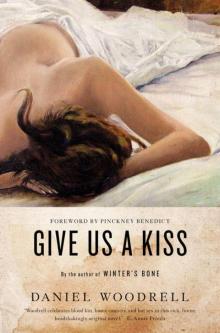 Give Us a Kiss: A Novel
Give Us a Kiss: A Novel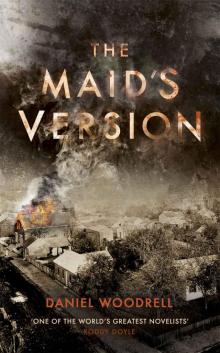 The Maid's Version
The Maid's Version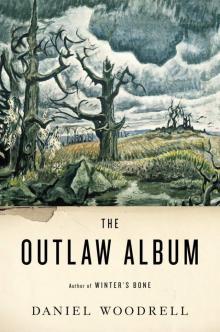 The Outlaw Album: Stories
The Outlaw Album: Stories Tomato Red
Tomato Red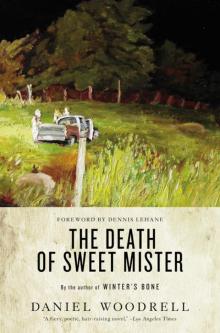 The Death of Sweet Mister
The Death of Sweet Mister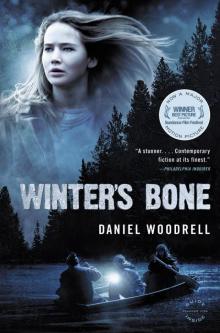 Winter's Bone
Winter's Bone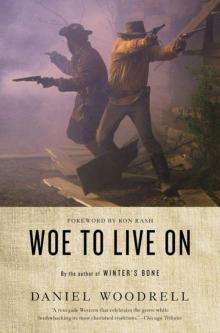 Woe to Live On: A Novel
Woe to Live On: A Novel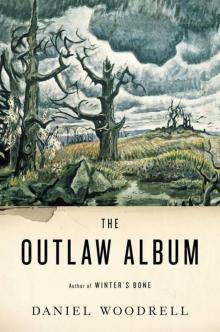 The Outlaw Album
The Outlaw Album